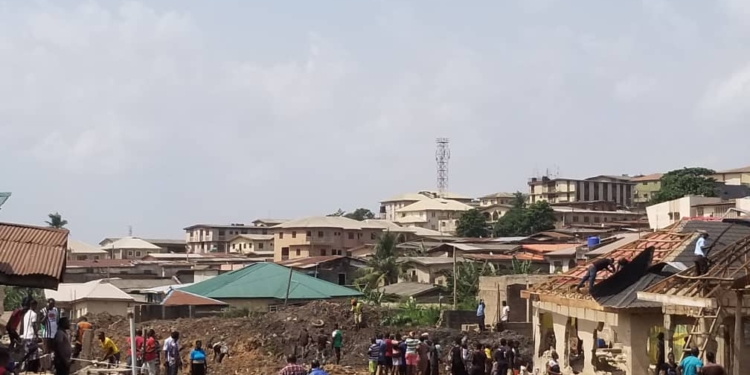Non Governmental Organizations with focus on informal settlements have called on the Lagos State Government to immediately provide adequate and reasonable compensation for losses; especially alternative accommodation for those affected by the recent demolition in Ifelodun, Ogba-Ijaye.
The NGOs; Spaces for Change, CEE-HOPE Nigeria and Community Life Project in a joint press statement also requested that the Lagos State government should create opportunities for genuine consultation with the affected people.
It would be recalled that officials of the Lagos State Ministry of Environment and Water Resources had demolished some houses at Ifelodun, Ogba earlier in the week because of the ongoing work on building drainage along the canal.
While the groups believed that, “the reasons for the demolition exercises which are targeted at averting flooding disasters because the evictees’ houses were allegedly situated too close to canals and waterways in the State, (if well founded) are reasonable, the pertinent questions are: Why wait till the advent of the rainy season to conduct displacement exercises? What ameliorative steps have been taken to provide humanitarian support and safe spaces for all evictees and persons displaced? Why sanction a stay-at-home order (lock-down) and in the same breath render people homeless and throw them into the streets? How does such an action help with social distancing?”
The groups stressed that the demolition exercise was carried out at a wrong time due to the COVID-19 Pandemic. They added that, “conducting displacement exercises during a highly contagious pandemic without more, smacks of executive insensitivity and impunity. Such action, coming at a time when the economy faces recession, due to the crippling of social and economic activities all over the world, will not only add to the economic burden here in Lagos state, but also increase unemployment and make residents even more vulnerable to environmental and health hazards.
“At a time COVID-19 is ravaging the world and Lagos residents are substantially complying with public health advisories by staying at home, the Lagos State launched demolition attacks targeted at the homes of the predominantly urban poor households, vulnerable communities and small-scale businesses without providing alternative safe spaces for the displaced.
“Compliance with stay-at-home orders is impossible for the 300 citizens displaced and forced into homelessness as a result of state-ordered forced evictions. Stay-at-home is only possible where people have a roof over their heads! The ill-planned displacement exercises potentially increases the risk of residents contracting and spreading COVID-19.
As a result of the risk that the evictees were exposed to, the groups asked that the Lagos State government “ensure access to screening tests and medical care for all made even more vulnerable to Covid-19, due to these ill-timed displacement exercises.”
They urged “the Lagos State government to enlist meaningful engagement protocols to protect groups affected, and to be affected by displacement exercises. Doing so will ensure access to grievance resolution, humanitarian support, resettlement and/or compensation for the affected groups.
“We also wish to remind Lagos State authorities that Nigeria has voluntarily subscribed to the commitments espoused in the International Covenant on Economic, Social and Cultural Rights.
“According to the United Nations Committee on Economic, Social and Cultural Rights, ‘the right to housing should not be interpreted in a narrow or restrictive sense which equates it with e.g. physical shelter as a commodity; but rather should be seen as the right to live somewhere in security, peace and dignity.’ Implicit in this duty to respect the right to housing, is an obligation on the government to adopt all appropriate legislative, administrative, budgetary, judicial, promotional and other measures required to realize the right to adequate housing for all (which includes improving housing conditions within the state) prioritizing for the most disadvantaged groups.

